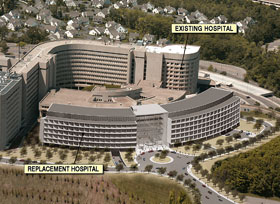  |
| HOME | THIS ISSUE | CALENDAR | GRANTS | BACK ISSUES | < BACK | NEXT > |
Trustees authorize replacement of university hospitalby Kristina Goodnough - February 5, 2007
|
||||
| The University's Board of Trustees has authorized construction of a new 352-bed hospital to replace and expand the Health Center's John Dempsey Hospital, setting in motion a major modernization and transformation of the university hospital. It has had no major upgrades since it opened 32 years ago. The action, approved by trustees at their meeting Jan. 30 in Storrs, is an essential step in a project that would replace the university's existing 224-bed hospital on the Health Center's Farmington campus with a new six-story, 546,000-square-foot facility. The board's authorization follows endorsement of the project by the Health Center's Board of Directors the previous week. "This is necessary to maintain the robust vitality of the state's only public medical and dental schools," University President Philip E. Austin said during the meeting. "We cannot rely on a hospital of John Dempsey's size and age to give our students access to the best education." Dr. Gerard N. Burrow, chairman of the Health Center board, said, "After a series of meetings over many months that culminated in a full-day retreat, members of the Board of Directors came to the consensus that if we don't replace the current hospital it will not be financially viable." Under the replacement plan, the new hospital building would be located directly in front of the existing main hospital entrance and house most of the hospital's services. John Dempsey Hospital opened in 1975.It contains 224 licensed beds, 204 for adults and 20 for infants in multi-bedded rooms. All are in service and are staffed. Of those beds, 116 are dedicated to specialized services, such as newborn, maternity, psychiatry, and Department of Correction patients, leaving only 108 flexible beds to serve the region's general health care needs. "I need a world-class facility to recruit world-class faculty to the medical and dental schools," said Dr. Peter Deckers, executive vice president of health affairs and dean of the medical school. The quality of the medical and dental schools is directly related to the quality of the hospital, he said. "All of them are dependent on each other; and the totality, done correctly, is greater than the sum of its parts. "The state subsidy to the medical and dental schools has increased only 1.1 percent in recent years," Deckers added.
"The hospital has been filling the gap for the past five years, the same hospital that was running a deficit 10 years ago. We turned the hospital around, but we have hit the wall relative to our ability to use hospital funds to fill the academic gap." Deckers said it is a fallacy that the hospital doesn't face the same set of problems as other hospitals in the state. "We are one of the top five hospitals in the state relative to accepting patients on Medicaid, which pays only 68 cents for every dollar of our true costs," he said. "Twenty-two percent of our patient days are dedicated to the Medicaid population. As a state agency, we are happy to accept our responsibility to care for the state's vulnerable populations, and we believe this project will support our ability to do that." The expansion project is estimated to cost $495 million, exclusive of financing. Deckers noted that the proposal does not include a request for new money from the state, but would instead finance the new hospital through the reallocation of existing UConn 2000 funds; through state-backed bonds that would be repaid with revenues from the new hospital; and through philanthropic gifts to the Health Center. Dr. John Rowe, chairman of the Board of Trustees, said, "The Health Center is prioritizing the hospital over other things. It is proposing a hospital of sufficient efficiency and scale that the revenues would support the debt." The financing is based on the General Assembly designating the hospital replacement project a named project under the UConn 2000 program. If this is approved, it will allow the Board of Trustees to reallocate existing funds in the program. The project also requires approval by the state Office of Health Care Access under its Certificate of Need process before construction can begin. |
| ADVANCE HOME UCONN HOME |

